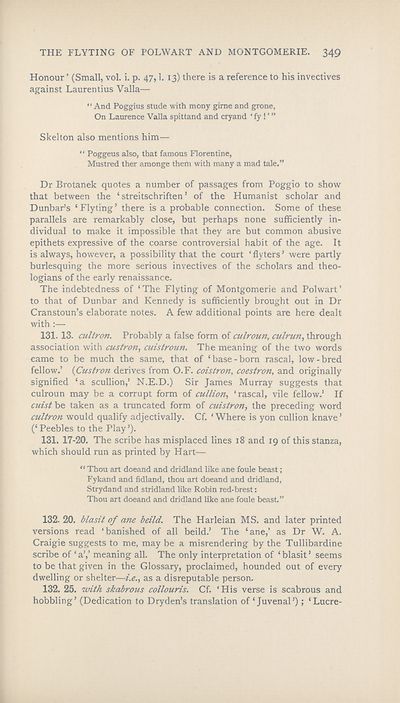Download files
Complete book:
Individual page:
Thumbnail gallery: Grid view | List view

THE FLYTING OF POLWART AND MONTGOMERIE. 349
Honour ’ (Small, vol. i. p. 47,1. 13) there is a reference to his invectives
against Laurentius Valla—
"And Poggius stude with mony girne and grone,
On Laurence Valla spittand and cryand 1 fy! ’ ”
Skelton also mentions him—
" Poggeus also, that famous Florentine,
Mustred ther amonge them with many a mad tale.”
Dr Brotanek quotes a number of passages from Poggio to show
that between the ‘ streitschriften ’ of the Humanist scholar and
Dunbar’s ‘Flyting’ there is a probable connection. Some of these
parallels are remarkably close, but perhaps none sufficiently in¬
dividual to make it impossible that they are but common abusive
epithets expressive of the coarse controversial habit of the age. It
is always, however, a possibility that the court ‘flyters’ were partly
burlesquing the more serious invectives of the scholars and theo¬
logians of the early renaissance.
The indebtedness of ‘The Flyting of Montgomerie and Polwart’
to that of Dunbar and Kennedy is sufficiently brought out in Dr
Cranstoun’s elaborate notes. A few additional points are here dealt
with :—
131. 13. cultron. Probably a false form of culroun, culrun, through
association with custron, cuistroun. The meaning of the two words
came to be much the same, that of ‘ base - born rascal, low - bred
fellow.’ {Custron derives from O.F. coistron, coestron, and originally
signified ‘a scullion,’ N.E.D.) Sir James Murray suggests that
culroun may be a corrupt form of cullion, ‘rascal, vile fellow.’ If
cuistbe. taken as a truncated form of cuistron, the preceding word
cultron would qualify adjectivally. Cf. ‘ Where is yon cullion knave ’
(‘ Peebles to the Play’).
131. 17-20. The scribe has misplaced lines 18 and 19 of this stanza,
which should run as printed by Hart—
“ Thou art doeand and dridland like ane foule beast;
Fykand and fidland, thou art doeand and dridland,
Strydand and stridland like Robin red-brest:
Thou art doeand and dridland like ane foule beast.”
132. 20. blasit of ane beild. The Harleian MS. and later printed
versions read ‘banished of all beild.’ The ‘ane,’ as Dr W. A.
Craigie suggests to me, may be a misrendering by the Tullibardine
scribe of ‘a’,’ meaning all. The only interpretation of ‘blasit’ seems
to be that given in the Glossary, proclaimed, hounded out of every
dwelling or shelter—i.e., as a disreputable person.
132. 25. with skabrous collouris. Cf. ‘His verse is scabrous and
hobbling’ (Dedication to Dryden’s translation of ‘Juvenal’); ‘Lucre-
Honour ’ (Small, vol. i. p. 47,1. 13) there is a reference to his invectives
against Laurentius Valla—
"And Poggius stude with mony girne and grone,
On Laurence Valla spittand and cryand 1 fy! ’ ”
Skelton also mentions him—
" Poggeus also, that famous Florentine,
Mustred ther amonge them with many a mad tale.”
Dr Brotanek quotes a number of passages from Poggio to show
that between the ‘ streitschriften ’ of the Humanist scholar and
Dunbar’s ‘Flyting’ there is a probable connection. Some of these
parallels are remarkably close, but perhaps none sufficiently in¬
dividual to make it impossible that they are but common abusive
epithets expressive of the coarse controversial habit of the age. It
is always, however, a possibility that the court ‘flyters’ were partly
burlesquing the more serious invectives of the scholars and theo¬
logians of the early renaissance.
The indebtedness of ‘The Flyting of Montgomerie and Polwart’
to that of Dunbar and Kennedy is sufficiently brought out in Dr
Cranstoun’s elaborate notes. A few additional points are here dealt
with :—
131. 13. cultron. Probably a false form of culroun, culrun, through
association with custron, cuistroun. The meaning of the two words
came to be much the same, that of ‘ base - born rascal, low - bred
fellow.’ {Custron derives from O.F. coistron, coestron, and originally
signified ‘a scullion,’ N.E.D.) Sir James Murray suggests that
culroun may be a corrupt form of cullion, ‘rascal, vile fellow.’ If
cuistbe. taken as a truncated form of cuistron, the preceding word
cultron would qualify adjectivally. Cf. ‘ Where is yon cullion knave ’
(‘ Peebles to the Play’).
131. 17-20. The scribe has misplaced lines 18 and 19 of this stanza,
which should run as printed by Hart—
“ Thou art doeand and dridland like ane foule beast;
Fykand and fidland, thou art doeand and dridland,
Strydand and stridland like Robin red-brest:
Thou art doeand and dridland like ane foule beast.”
132. 20. blasit of ane beild. The Harleian MS. and later printed
versions read ‘banished of all beild.’ The ‘ane,’ as Dr W. A.
Craigie suggests to me, may be a misrendering by the Tullibardine
scribe of ‘a’,’ meaning all. The only interpretation of ‘blasit’ seems
to be that given in the Glossary, proclaimed, hounded out of every
dwelling or shelter—i.e., as a disreputable person.
132. 25. with skabrous collouris. Cf. ‘His verse is scabrous and
hobbling’ (Dedication to Dryden’s translation of ‘Juvenal’); ‘Lucre-
Set display mode to: Large image | Zoom image | Transcription
Images and transcriptions on this page, including medium image downloads, may be used under the Creative Commons Attribution 4.0 International Licence unless otherwise stated. ![]()
| Publications by Scottish clubs > Scottish Text Society publications > Old series > Poems of Alexander Montgomerie > (432) |
|---|
| Permanent URL | https://digital.nls.uk/110175233 |
|---|
| Description | A collection of over 100 Scottish texts dating from around 1400 to 1700. Most titles are in Scots, and include editions of poetry, drama, and prose by major Scottish writers such as John Barbour, William Dunbar, Gavin Douglas, and George Buchanan. Edited by a key scholarly publisher of Scotland's literary history, and published from the late 19th century onwards by the Scottish Text Society. Available here are STS series 1-3. |
|---|

